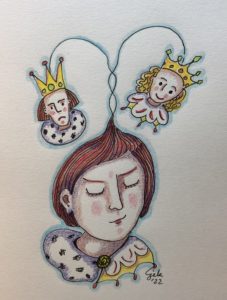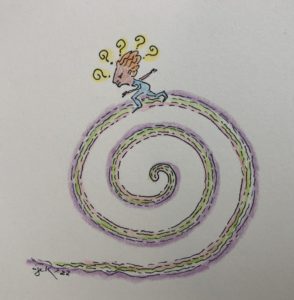
– Illustration © 2022 Jan Ketchel
Our attention and emotional excitement are drawn outwardly to events that show us our very personal drama within. Our inner director is so stupendous, we hardly realize that our outer fascination is directed from the depths of our own psyche, as it seeks to captivate the attention of our consciousness.
So held in the grip are we by certain events upon the world stage that it seems impossible to believe that they are actually reflecting something quite personal within our own selves. The movie we are drawn to see might be our own personal shadow play, or it may reflect the seismic stirrings at the deeper, unconscious level of our collective Soul life.
To discover the source, close your eyes and ask your Soul to reveal the source of your attraction, fascination, repulsion, and passion for the story it has directed you to. Allow your spontaneous thoughts and images to interact with your reflective consciousness. Prepare to take deeper ownership for the fuller picture of the many selves of your self.
The Queen’s funeral might find one unexpectedly overcome by a depth of emotion completely enigmatic to one’s conscious attitude toward the monarch and sense of self. Closing one’s eyes to the world, an image of personal mother may appear. A series of vignettes might ensue, expressing her life of self-sacrifice and service, as she provided nurturance and security to all. A wave of old grief might invite one to emotional release.
Perhaps one might be drawn instead to images of mother repressing emotion in all, stressing rules and limitations in her reign over one’s childhood. Perhaps one is then drawn into the emotion of guilt that one actually felt joy at liberation upon her passing.
At another level, one might encounter the numinous energy of royalty, the Great Mother Queen, whose coffin concealing her lifeless body draws thousands to wait countless hours to walk by and to personally commune with her Goddess energy. Welcome to the the domain of the archetypes.
Archetypes are nature’s images that direct human behavior from behind the mind’s eye. In archetypal reality, royalty is the Queen Bee, whom the drones of humanity are organized to serve. Queen and King are the ultimate mother and father in all benevolent or cruel authority figures that we encounter throughout life. We react to their projection with anxiety, awe, fear, and anger.
Inwardly, these archetypes are the ego’s parents, to which it owes its life. When ego inflates, it identifies with their power. When it deflates, it abandons all its power, as it returns to the womb in total surrender.
In Queen Elizabeth, ego highlighted the value of service—service to the established rules. Queen Elizabeth represented ego sacrifice to a higher value. Human predilection must conform to royal expectation, without exception.
Inwardly, human guilt and longing may be the consequence of our relationship to these powerful archetypes. Has my life gone wrong because I refused to sacrifice to service, that is, to what was expected of me? Is my fulfillment denied because my needs have offended the royals within? Is it time to break free of royal bondage? Am I prepared to go it alone, to honor my right to choose? And if I do, am I prepared to bear the wrath of the royal parents?
At the deepest collective level the boots of the activated Gods are making the Earth shudder. The Queen is dead, long live the King. Inwardly, this transition of power marks the emergence of a new rule, perhaps dictated by transition to a new stage of the life cycle. Clearly, the world is floundering as it seeks a new value to live by.
The Queen’s adherence to ancient precedent cannot lead us to salvation. What is needed is not adherence and sacrifice to tradition but service and acquiescence to what is truly needed for the Earth, and all her inhabitants. Can ego serve such a King?
These are the many worlds within that play for attention in our changing world without. Though we might laugh at the silliness of monarchy, perhaps if we close our eyes and discover the powers that be within, we’ll understand the reason for a tear as we listen to the bagpipes sending this Queen on her definitive journey.
With closed eyes opened,
Chuck



